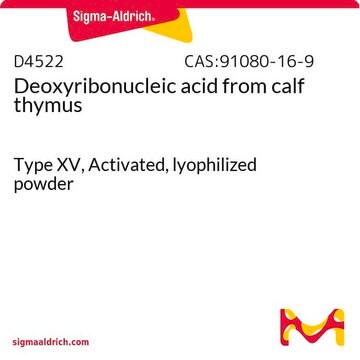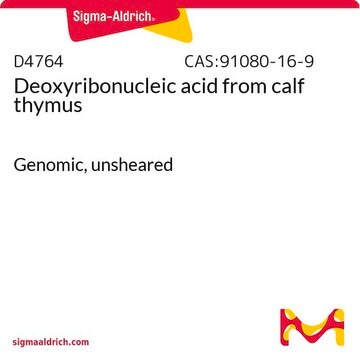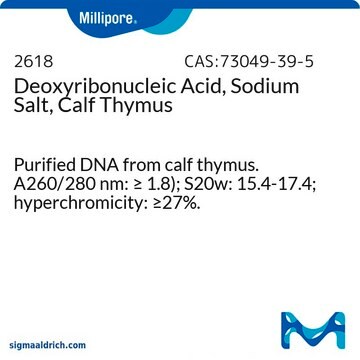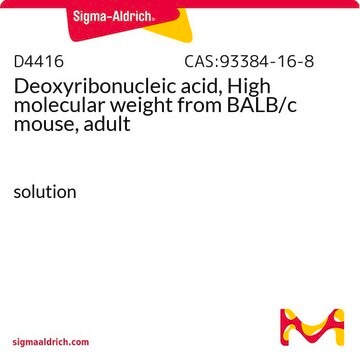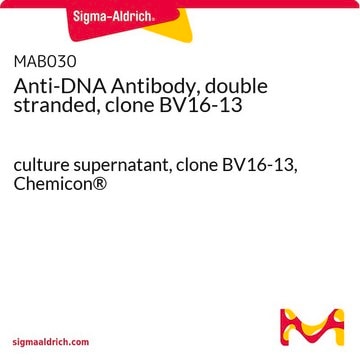D8515
Deoxyribonucleic acid−cellulose double-stranded from calf thymus DNA
lyophilized powder
Synonym(s):
DNA, Deoxyribonucleic acid, ds-DNA-Cellulose, DNA-Cellulose
Sign Into View Organizational & Contract Pricing
All Photos(3)
About This Item
Recommended Products
form
lyophilized powder
extent of labeling
3-8 mg double-stranded calf thymus DNA/g
storage temp.
−20°C
General description
Deoxyribonucleic acid−cellulose double-stranded from calf thymus DNA, also known as ctDNA is a natural source of DNA designed for DNA binding agent studies. The detection limits of ctDNA are around 2.0ng and the linear ranges of light scattering intensity (I(LS)) is 0.05-1.5 mµg.
Application
Deoxyribonucleic acid−cellulose double-stranded from calf thymus DNA is used to study the binding parameters and binding specificity of a variety of proteins, nucleotides, and chemical reagents including anti-cancer agents. It is frequently used in pull-down assays and chromatographic procedures.
Quality
May contain a trace of Tris and EDTA.
Storage Class Code
11 - Combustible Solids
WGK
WGK 3
Flash Point(F)
Not applicable
Flash Point(C)
Not applicable
Personal Protective Equipment
dust mask type N95 (US), Eyeshields, Gloves
Certificates of Analysis (COA)
Search for Certificates of Analysis (COA) by entering the products Lot/Batch Number. Lot and Batch Numbers can be found on a product’s label following the words ‘Lot’ or ‘Batch’.
Already Own This Product?
Find documentation for the products that you have recently purchased in the Document Library.
Customers Also Viewed
Lutz Wobbe et al.
Nucleic acids research, 41(13), 6553-6567 (2013-05-08)
The molecular function of mTERFs (mitochondrial transcription termination factors) has so far only been described for metazoan members of the protein family and in animals they control mitochondrial replication, transcription and translation. Cells of photosynthetic eukaryotes harbour chloroplasts and mitochondria
D Pisetsky et al.
The Journal of rheumatology, 26(9), 1934-1938 (1999-09-24)
To elucidate the epitope structure to DNA by identifying antigenic determinants on bacterial DNA bound by anti-DNA antibodies from normal human subjects (NHS) and patients with systemic lupus erythematosus (SLE). Sera from NHS and patients with SLE were tested by
Liyun Zhang et al.
Scientific reports, 4, 3776-3776 (2014-01-21)
The development of a fluorescent probe capable of detecting and distinguishing the wide diversity of G-quadruplex structures is particularly challenging. Herein, we report a novel BODIPY-based fluorescent sensor (GQR) that shows unprecedented selectivity to parallel-stranded G-quadruplexes with exposed ends and
T Kuzuhara et al.
Biochemical and biophysical research communications, 362(4), 805-810 (2007-09-04)
Tumor necrosis factor-alpha (TNF-alpha) inducing protein (Tipalpha) is a carcinogenic factor secreted from Helicobacter pylori (H. pylori), mediated through both enhanced expression of TNF-alpha and chemokine genes and activation of nuclear factor-kappaB. Since Tipalpha enters gastric cancer cells, the Tipalpha
A Georgaki et al.
Nucleic acids research, 22(7), 1128-1134 (1994-04-11)
A DNA helicase from calf thymus, called DNA helicase F, copurified with replication protein A through several steps of purification including DEAE-Sephacel, hydroxyapatite and single stranded DNA cellulose. It is finally separated from replication protein A on FPLC Mono Q
Our team of scientists has experience in all areas of research including Life Science, Material Science, Chemical Synthesis, Chromatography, Analytical and many others.
Contact Technical Service

